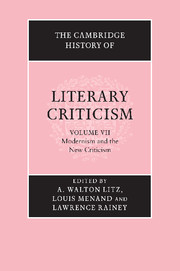Book contents
- Frontmatter
- Introduction
- THE MODERNISTS
- THE NEW CRITICS
- THE CRITIC AND THE INSTITUTIONS OF CULTURE
- 14 Criticism and the academy
- 15 The critic and society, 1900–1950
- 16 The British ‘Man of Letters’ and the rise of the professional
- 17 F. R. Leavis
- 18 Lionel Trilling
- 19 Poet-critics
- 20 Criticism of Fiction
- Bibliography
- Index
- References
18 - Lionel Trilling
from THE CRITIC AND THE INSTITUTIONS OF CULTURE
Published online by Cambridge University Press: 28 March 2008
- Frontmatter
- Introduction
- THE MODERNISTS
- THE NEW CRITICS
- THE CRITIC AND THE INSTITUTIONS OF CULTURE
- 14 Criticism and the academy
- 15 The critic and society, 1900–1950
- 16 The British ‘Man of Letters’ and the rise of the professional
- 17 F. R. Leavis
- 18 Lionel Trilling
- 19 Poet-critics
- 20 Criticism of Fiction
- Bibliography
- Index
- References
Summary
One of the profound ironies of contemporary academic criticism is that, though its practitioners describe themselves as producers and distributors of cultural values, they have been patently unable to acquaint the culture at large with the content of the work they do. There are, of course, many reasons for this, some of them beyond the control of academics. The ‘public sphere’, after all, despite some pockets of freedom and rigour, bears little resemblance to the classical public sphere of eighteenth-century Britain as described, for example, by Jürgen Habermas and Terry Eagleton. Given the prevalence of advertising, publicity, mass media, and manufactured public opinion and consent, little opportunity exists for academics or others to transform the public sphere in to a site of ‘communicative action’, Habermas's term for open and invigorating discourse that brings scientific, moral, and aesthetic evaluation to bear in order to democratise and transform the polity. Nevertheless, despite these difficulties, academics have been increasingly interested in exploring their relationship to the public sphere, perhaps more so than at any time since the 1960s. This is due in no small measure to the attacks that have been made on the academy by conservatives, who have alleged that contemporary criticism is responsible for an assault on the canon, on taste, on values, on shared beliefs and practices, and on common sense. In part, too, the renewed interest in the public sphere is the result of frustration following more than two decades during which the dramatic politicisation of literature and criticism has been largely confined to the politics of theory alone, as if such activity could be separated from the politics of the critic as citizen – as voter, as a community member with political beliefs and commitments, as activist.
- Type
- Chapter
- Information
- The Cambridge History of Literary Criticism , pp. 423 - 438Publisher: Cambridge University PressPrint publication year: 2000



